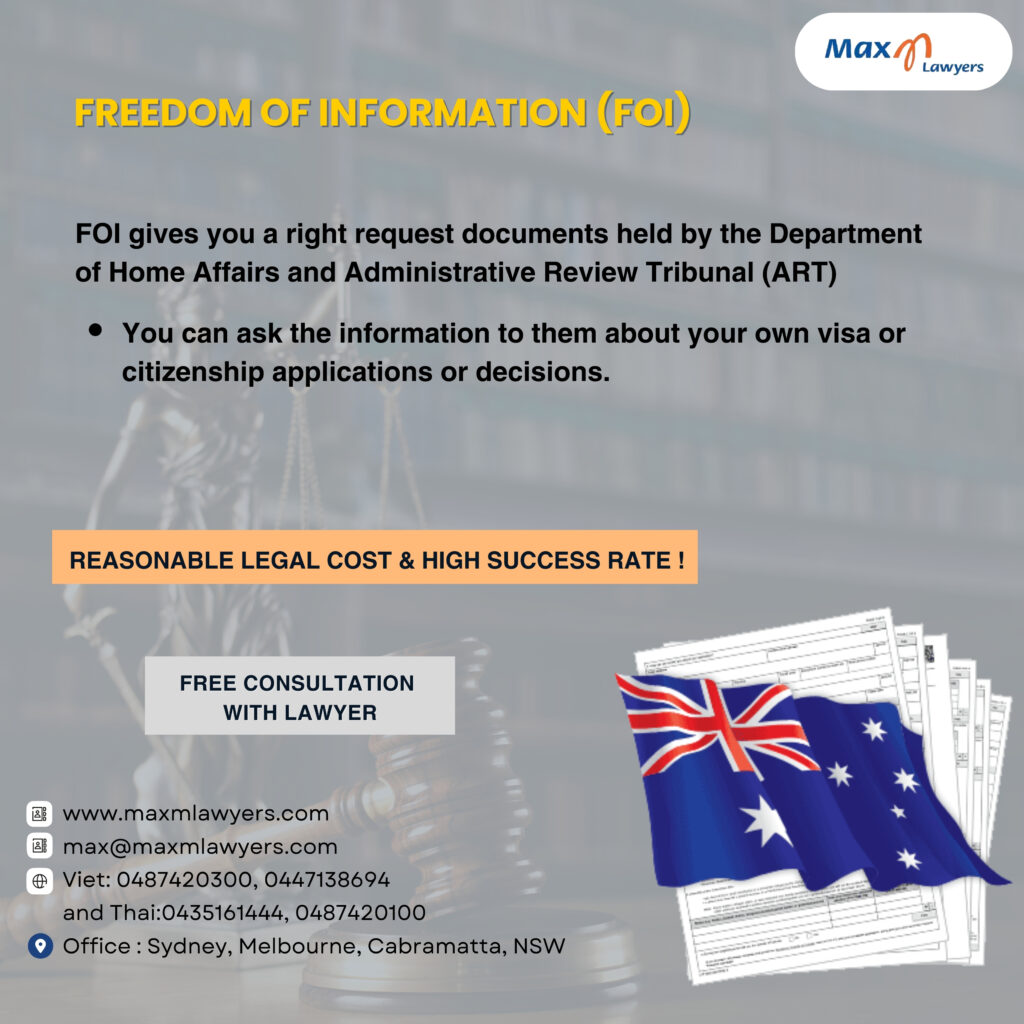WE HAVE THE EXPERTISE TO CARRY SIMPLE TO COMPLICATED VISA APPLICATIONS. YOUR JOURNEY TO SETTLE IN AUSTRALIA BEGINS HERE!
Max M Lawyers has a highly successful record in migration applications which enable us to assess your application as per your special circumstances with great accuracy and confidence. We provide free face-to-face consultation to comprehensively assess your personal circumstances and then tailor a practical solution to match your migration needs. Choosing Max M Lawyers to represent you will allow you to streamline your immigration and legal matters all at once. With Max M Lawyers experience and knowledge across a wide range of areas of law, all of your matters will be carried out by the firm. We can assist with the purchase of property, purchase of business, lease of commercial premises and establish companies before you have successfully obtained permanent or temporary residency in Australia.
We understand that the migration process is time consuming and dealing with the Department of Immigration and the Administrative Appeals Tribunal(AAT) and Minister Intervention may be frustrating. However, to lessen the burden, we will handle and deal with all matters professionally and efficiently with the DIBP once we represent you.
Max M Lawyers is registered as Migration Lawyers by the Legal Practitioner Number (LPN) 5511267. We are perceived as experienced lawyers who practice in migration law. Migration laws in Australia are continually changing and complex. At Max M Lawyers we strive to be leaders in both knowledge and service. We can provide up to date advice, and then guide you through the complicated process of satisfying criteria and applying for visas. Our team has rich experience in assisting you with both your visa application and appeals at the Administrative Appeals Tribunal(AAT).
Family Visa
Protection Visa
Working Visa
- Training visa (407)
- Temporary Skill Shortage visa
(482) - Skilled Work Regional
Provisional (491) - Skilled Employer Sponsored
Regional (Provisional) visa (494) - Employer Nomination
Scheme(186) Work Permit General Skilled Migration Visa - Temporary Graduate visa (485)
- Skilled Independent Visa (189)
Appeal & Court
Other Visa
Process
1. Consultation and recommendation of suitable visa
Make a booking to speak to our senior immigration lawyer.
You can meet with us for a face to face consultation at our
office, via Google Meeting, or by phone call. After this, we
will send you paperwork that confirms our engagement to
represent you.
2. Preparation and Support
We will prepare written submissions in support of your
visa application and also supporting documents. This will
be based on your individual cases, supported by evidence
where appropriate.
3. Application and Submission
We submit your application to the relevant body
(Department of Home Affairs. courts, or tribunal). We will
continue to update you concerning the status of your
application.
4. Representation and success
We will keep you updated about your application and
notify you of the application outcome. If you receive an
unfavourable outcome, we will reapply for you.
Partner Visa
Partner visa (apply in Australia) allows the partner or spouse of an Australian citizen, Australian permanent resident to live in Australia. You must have a sponsor when you lodge your application.
There are two steps for the partner visa application: the temporary (Subclasses 820) and the permanent partner visas (subclass 801).
If you want to apply for a partner visa as a de facto partner, usually you must be in a de facto relationship for at least 12 months. Time spent dating or in an online relationship might not count as being in a de facto relationship. Your relationship can be with someone of the same or different sex.
The 12-month requirement will not apply if you can show us compelling and compassionate circumstances exist. It also will not apply if you have registered your relationship with an Australian authority.
When you apply for a visa, you need to provide evidence of your genuine and continuing relationship with your partner. You must be in Australia when you apply for this visa. Family who applies with you must also be in Australia. You must either live together or do not live permanently apart. Include a minimum of two statutory declarations, The Commonwealth Statutory Declaration form is available from the Attorney-General’s Department.
We can help with your visa applications. For your successful visa application, we use
knowledge of, or experience in, migration procedure to assist with visa applications or other visa matters by preparing, or helping to prepare a visa application or other document, advising about a visa application or visa matter, representing in, or preparing for, proceedings before a court or review authority in relation to a visa matter.
At the first free consultation with you, after we check your visa status, and conditions, we
recommend your eligibility to apply for a visa. and then apply for the partner visa together. After temporary partner visa grant, we apply for the permanent partner visa with additional documents. We will let you know the decision from the immigration.
If you have a compelling and compassionate circumstances and where all the required
information has been submitted, Application can only be considered for priority processing and we can help you apply for the visa urgently. you may be eligible to access Australia’s Medicare card, while you await a decision on your visa application. You can travel to and from Australia as many times as you want while you are waiting after applying for the visa.
If your visa has been refuse, contact us. We will help you to apply for AAT.
You might not be eligible to apply for this visa if you do not hold a substantive visa and you have had a visa cancelled, refused or overstayed, contact us. We will help you to apply for the visa in Australia If you have a compelling and compassionate circumstances.
If your visa has a condition that prevents further stay, such as condition 8503, We can help you to remove this condition.
If you are experiencing family violence, we are able to help you for consideration to be granted your temporary and permanent visa partner visa.
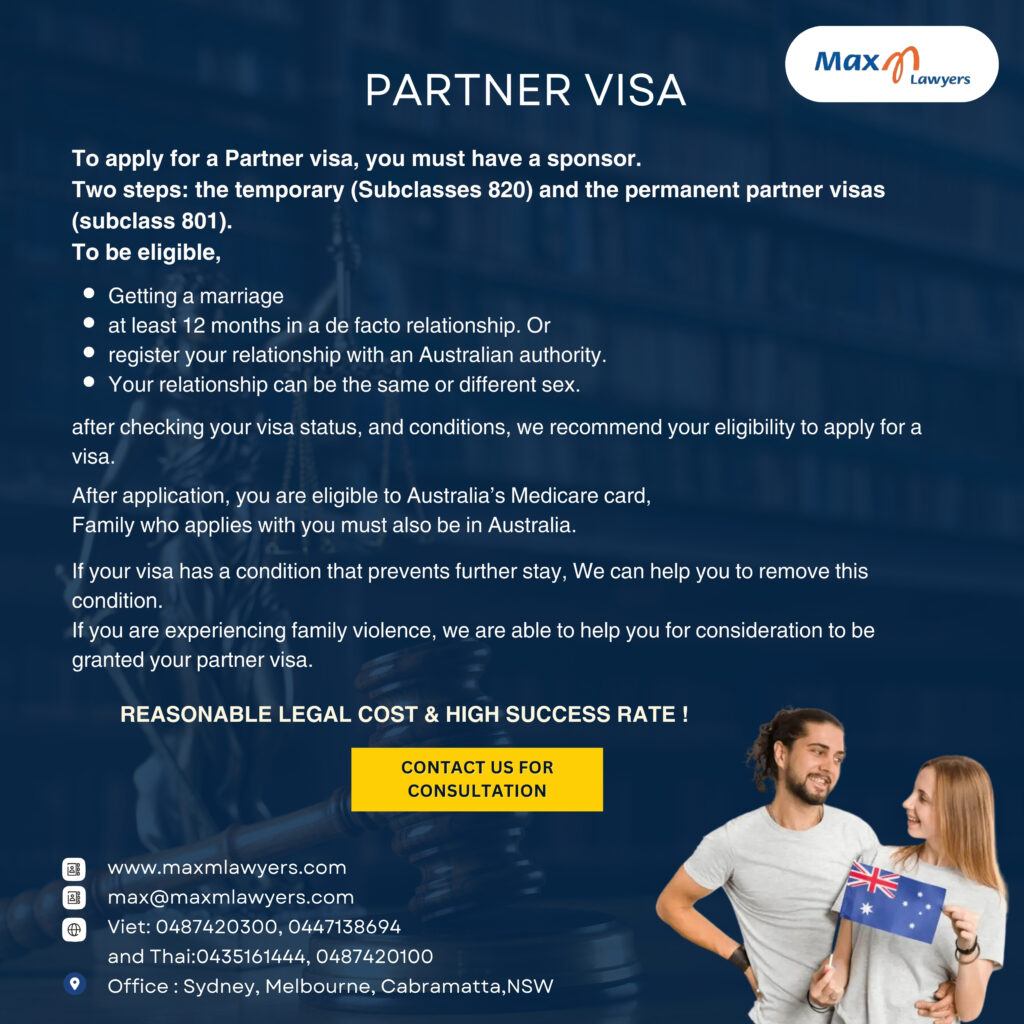
Child Visa
Generally, children are sponsored by their biological or adoptive parents. There is also an Orphan Relative visa option to sponsor a relative to come to Australia to live. This applies if their parents are deceased, can’t care for them or can’t be found.
The child must be a dependent child of a parent who is an Australian citizen, eligible New Zealand citizen or holder of an Australian permanent visa. The child should be under 18 years but if they are full-time students aged over 18 and under 25 and financially dependent on the parent, they can apply for the visa. Furthermore, if they are over 18 and unable to work due to a disability, they also can apply for the visa.
The child must be sponsored by an eligible parent or their parent’s spouse or de facto partner.
The child can’t be or ever have been married or engaged to be married in a de facto relationship.
The child and any dependants who apply for the visa with them must meet our health requirement. If the child is aged 16 years or over, they must meet our character requirement.
At the first free consultation with you, after we check your visa status, and conditions, we recommend your eligibility to apply for a visa. and then apply for the child visa together.
In the first free consultation, after checking your visa status and conditions, we will recommend you whether you are eligible to apply for a visa. For your successful visa application, based on our knowledge and experience in applying for a visa, we will fill out your visa application and prepare additional documents. After your visa grant, we will let you know the decision from the department of immigration.
If your visa has been refused, contact us. We will help you to apply for ART.
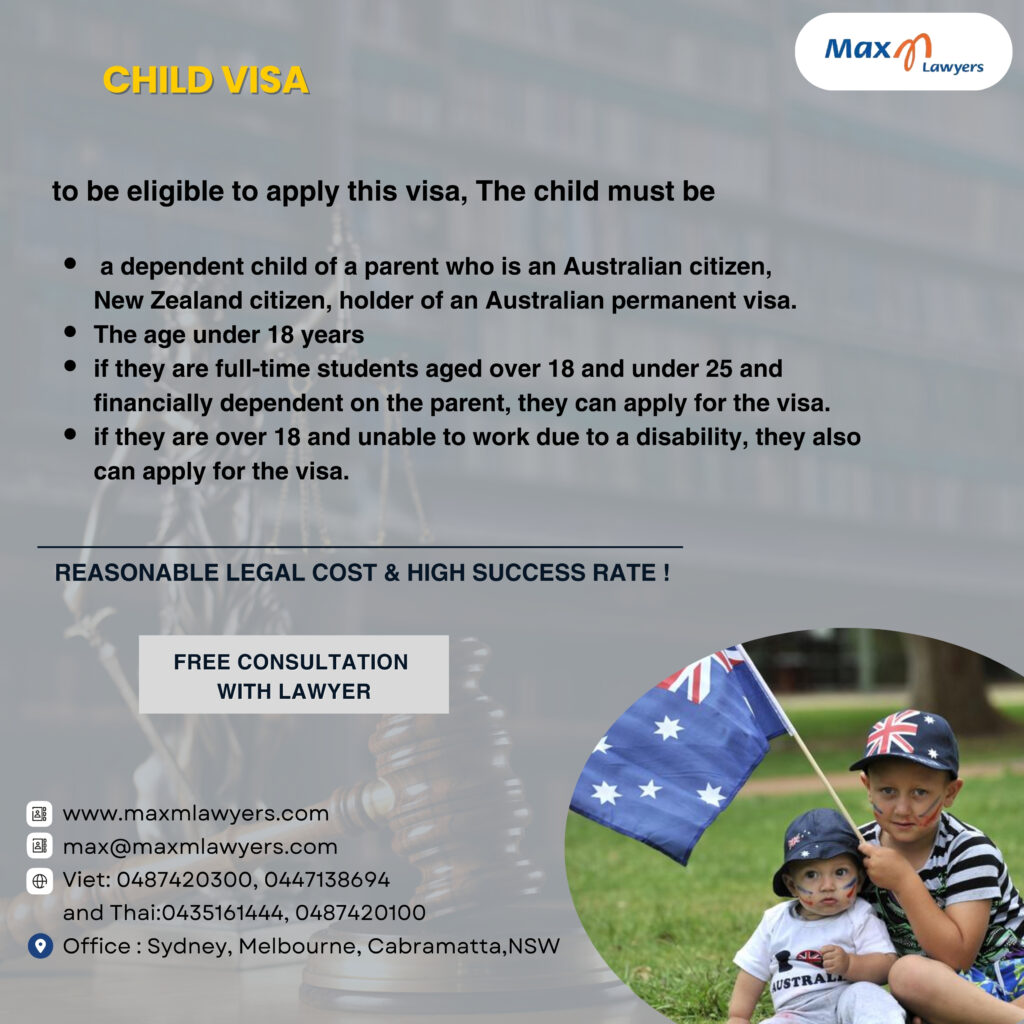
Parent Visa
Parent visas allow Australian citizen, permanent resident, or eligible New Zealand citizen to sponsor parents to migrate to Australia. With this visa, your parents can enrol in Australia’s public healthcare scheme (Medicare) and apply for Australia citizenship, if Eligible.
Parent visas are open to those parents who pass the balance of the family test. This requires parents to have at least half of their children settled in Australia. This means you can sponsor your parents if you are living in Australia and you have one sibling overseas but if there are two siblings overseas, you cannot sponsor your parents.
Parents can include members of the family unit in their application when they apply.
Parents are required to include details of all family members in their application form whether they are migrating or not. Family members who apply for the visa must meet health and character requirements. Family members who are not coming to Australia might also have to meet health and character requirements.
Parents can be in or outside Australia, but not in immigration clearance, when they apply for the visa. If parents apply in Australia, any family members who apply with them must also be in Australia, but not in immigration clearance, when they apply.
If parents apply outside Australia, any family members who apply for the visa with them must also be outside Australia when you apply. If parents are applying as a retiree, they must be in Australia, but not in immigration clearance, when they apply.
Parents are always welcome to apply for a Visitor visa to come to Australia to visit.
If you are looking to reunite with your family in Australia, MAX M LAWYERS is here to guide you through the parent visa application process, ensuring a smooth and efficient experience. We understand how important family connections are, and our team with more than 20 years of experience in immigration law, is dedicated to supporting you at every step of the application process. With our affordable pricing and high success rate, you can trust that we’ll work tirelessly to help you bring your loved ones together in Australia.
Let us help you turn your dream of family reunification into a reality.
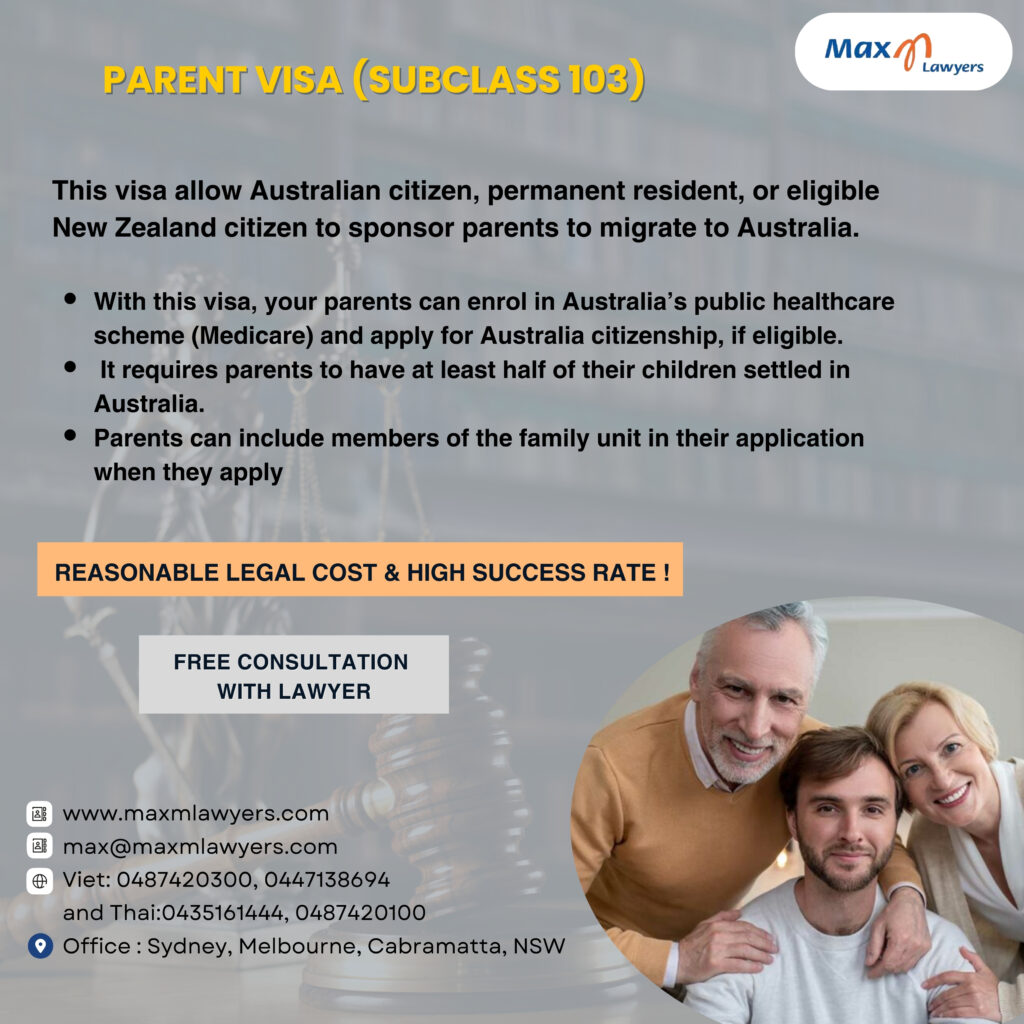
Sponsored Parent Temporary Visa (subclass 870)
The Sponsored Parent Temporary Visa provides parents with pathway to temporarily reunite with their children in Australia. This visa allows the parent of an Australian Citizen and Australian Permanent Resident to visit Australia for 3 to 5 years.
To apply, the applicant (parent) must either be the biological, legal (including adoptive) parent, step-parent or parent in-law of the Sponsor (child).
The Sponsor should apply for a sponsorship application first and wait for approval,
before applying for the visa. The application must be lodged within six months after sponsorship approval. The Sponsor is limited to one sponsorship at a time and can cover up to 2 parents only per household. The child can sponsor one or both of their own parents, one or both of their partner’s parents, or one of their own parents and one of their partner’s parents. The sponsor cannot lodge a new sponsorship application until their current approved sponsorship ends.
With this Visa, the parent can apply for further visas to visit up to a maximum period in Australia for 10 years and they are not allowed to work in Australia. If you have a compelling and compassionate circumstances and where all the required information has been submitted, application can only be considered for priority processing and we can help you apply for the visa urgently.
In the first free consultation, after checking your visa status and conditions, we will
recommend you whether you are eligible to apply for a visa. For your successful visa application, based on our knowledge and experience in applying for a visa, we will fill out your visa application and prepare additional documents. After your visa grant, we will let you know the decision from the department of immigration.
If your visa has been refused, contact us. We will help you to apply for ART.
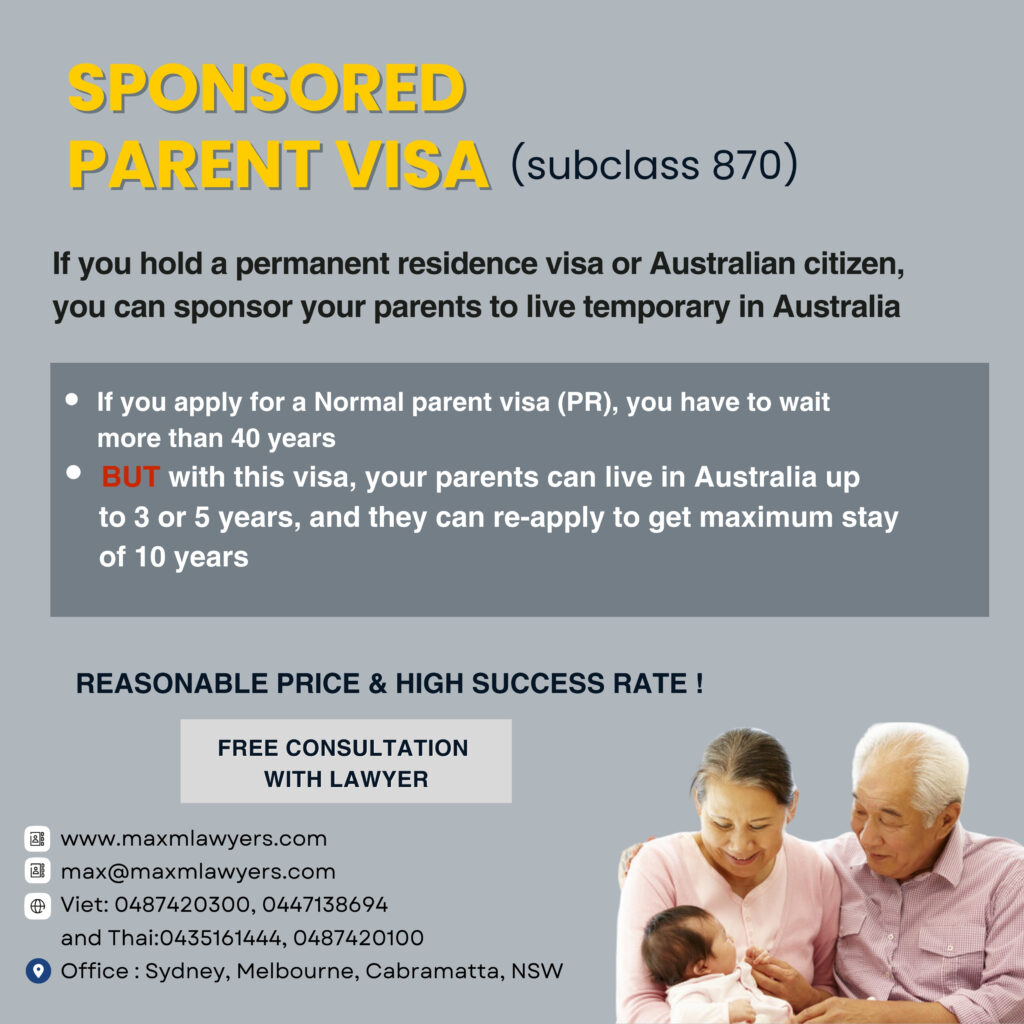
Family Violence (for the Partner Visa)
Domestic and family violence is not acceptable under any circumstance and is a crime in Australia. Domestic and family violence is any conduct that makes you fear for your family’s safety and wellbeing. It may be directed at you, your family, pets or property.
Domestic and family violence can include:
● physical violence
● sexual assault
● verbal or emotional abuse
● controlling behaviour
● stalking
● technology facilitated abuse
● financial abuse
● abuse of the elderly
● forced isolation or economic deprivation, including dowry-related abuse.
After applying for a Partner Visa, when you have suffered family violence, You and your family do not have to remain in a relationship where you fear for your or your family’s safety to stay in Australia and you can process your partner visa continuously.
You should provide following document under the family violence provisions of the Migration Regulations 1994 (the Regulations);
You may provide either judicial evidence or non-judicial evidence.
For the judicial evidence, you should provide a Family Law Act 1975 injunction against the sponsor for assault or some other form of violence against the applicant or member of either the applicant or sponsor’s family unit. You can provide a final court order against the sponsor for assault or some other form of violence against the applicant or member of either the
applicant or sponsor’s family unit.
If you provide non-judicial evidence, you must provide at least two forms of acceptable evidence as specified in Legislative Instrument LIN 23/026. The two pieces of evidence must be of different types, and a statutory declaration made by you.
Please contact us, our specialized lawyer will help you.
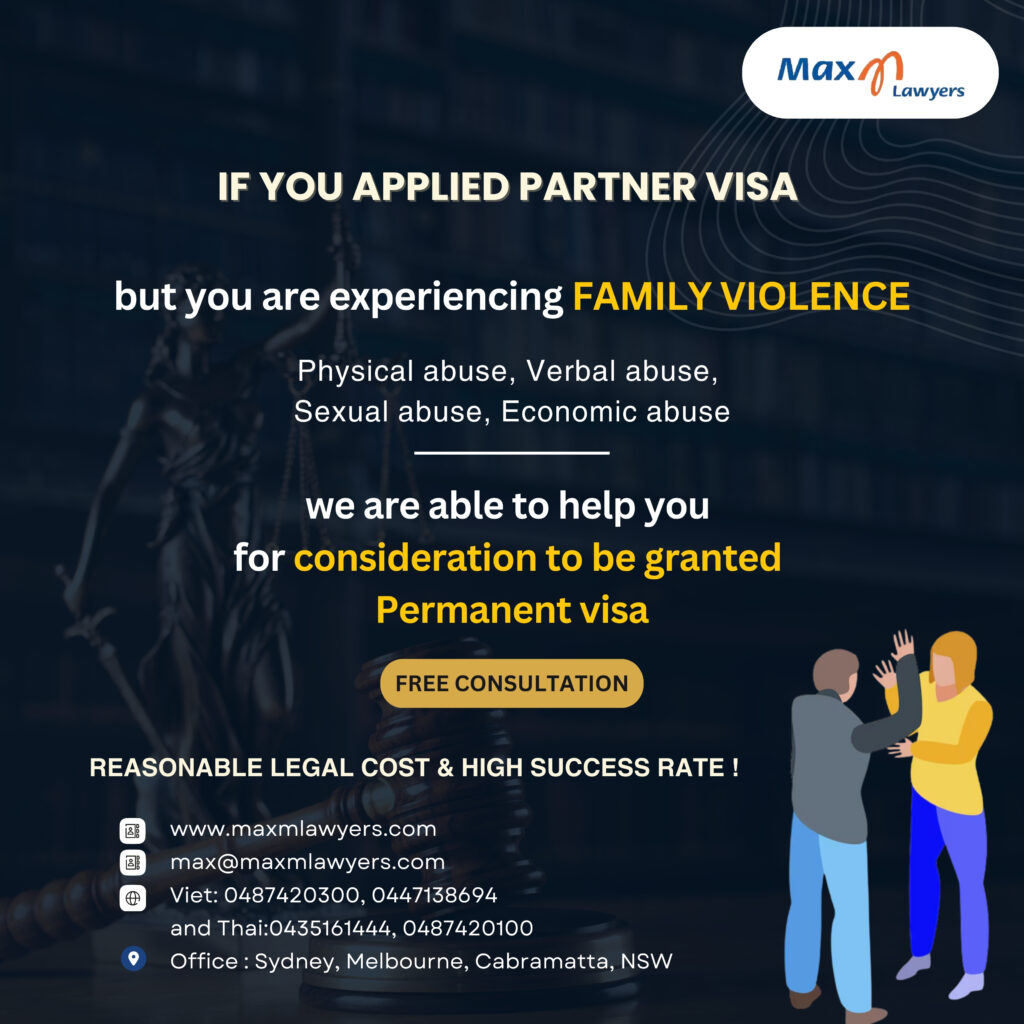
Protection visa (subclass 866)
Protection visa is for people who arrived in Australia on a valid visa and want to seek asylum. Protection visa is a permanent visa. you can live, work and study in Australia permanently.
You can access government services such as Medicare and Centrelink
services and sponsor eligible family members for permanent residence through the offshore Humanitarian Program. You also can travel to and from Australia for 5 years.
Members of the same family unit may apply together on the same application. They must be in Australia at the time of application. Members of the same family unit are spouse or de facto partner, dependent child or step-child, dependent child or step-child of the family head’s partner, other dependent relatives of the family head.
You can’t make a valid application for this visa if you are an unauthorised maritime arrival.
As defined by the Migration Act 1958 (Migration Act), in order to engage Australia’s protection obligations, you must be a refugee or meet the complementary protection criteria. Australia must not return people to their home country where there is a risk that the person may suffer harm because they engage Australia’s protection obligations.
In the first free consultation, after checking your visa status and conditions, we will recommend you whether you are eligible to apply for a visa. For your successful visa application, based on our knowledge and experience in applying for a visa, we will fill out your visa application and prepare additional documents. After your visa grant, we will let you know the decision from the department of immigration.
If your visa has been refused, contact us. We will help you to apply for ART.
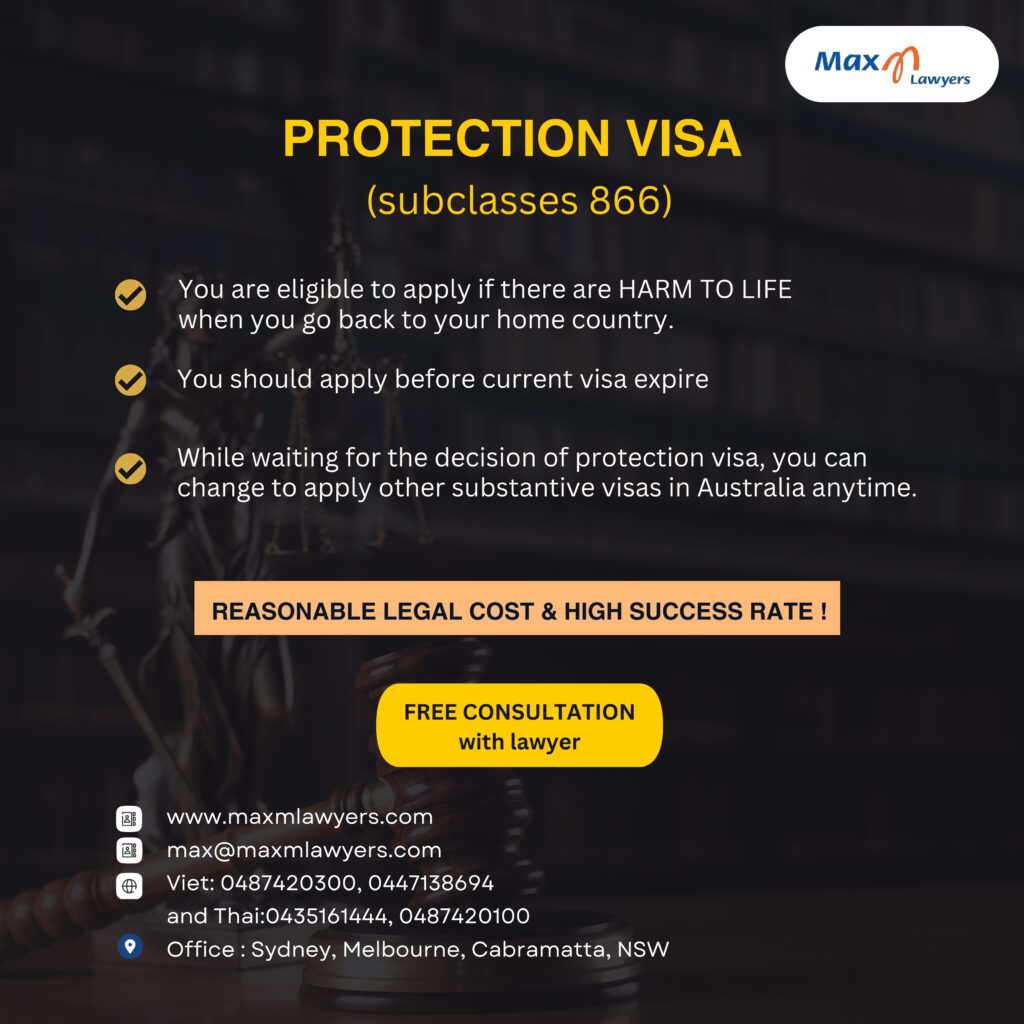
Training visa (subclass 407)
Training visa (subclass 407) allows you to take part in workplace-based occupational training activities to improve your skills for your job, area of tertiary study, field of expertise or in a professional development training program in Australia.
With this visa you can visit Australia to complete a workplace-based training (to improve your skills for your current occupation, area of tertiary study or field of expertise), or a professional development training program. This is a temporary visa. The immigration might grant you a visa to stay in Australia for up to 2 years. You can leave and re-enter Australia on the visa while it is valid. You can’t stay in Australia longer by extending this visa, you can apply for another visa.
You can include members of the family unit in your application when you apply. Family members who apply for the visa with you must also meet our health and character requirements. If you apply for this visa from outside Australia, family members who are not coming to Australia might also have to meet our health requirements.
Your sponsor must be approved as a temporary activities sponsor. Your sponsor must have nominated you to participate in a program of occupational training. Nomination requirements are different depending on the purpose or type of training.
To apply for the training visa, you must be 18 years old or older at the time the
department of immigration decides your visa application. If you are applying in Australia, you must currently hold a valid temporary substantive visa.
In the first free consultation, after checking your visa status and conditions, we will recommend you whether you are eligible to apply for a visa. For your successful visa application, based on our knowledge and experience in applying for a visa, we will fill out your visa application and prepare additional documents. After your visa grant, we will let you know the decision from the department of immigration.
If your visa has been refused,contact us. We will help you to apply for ART.
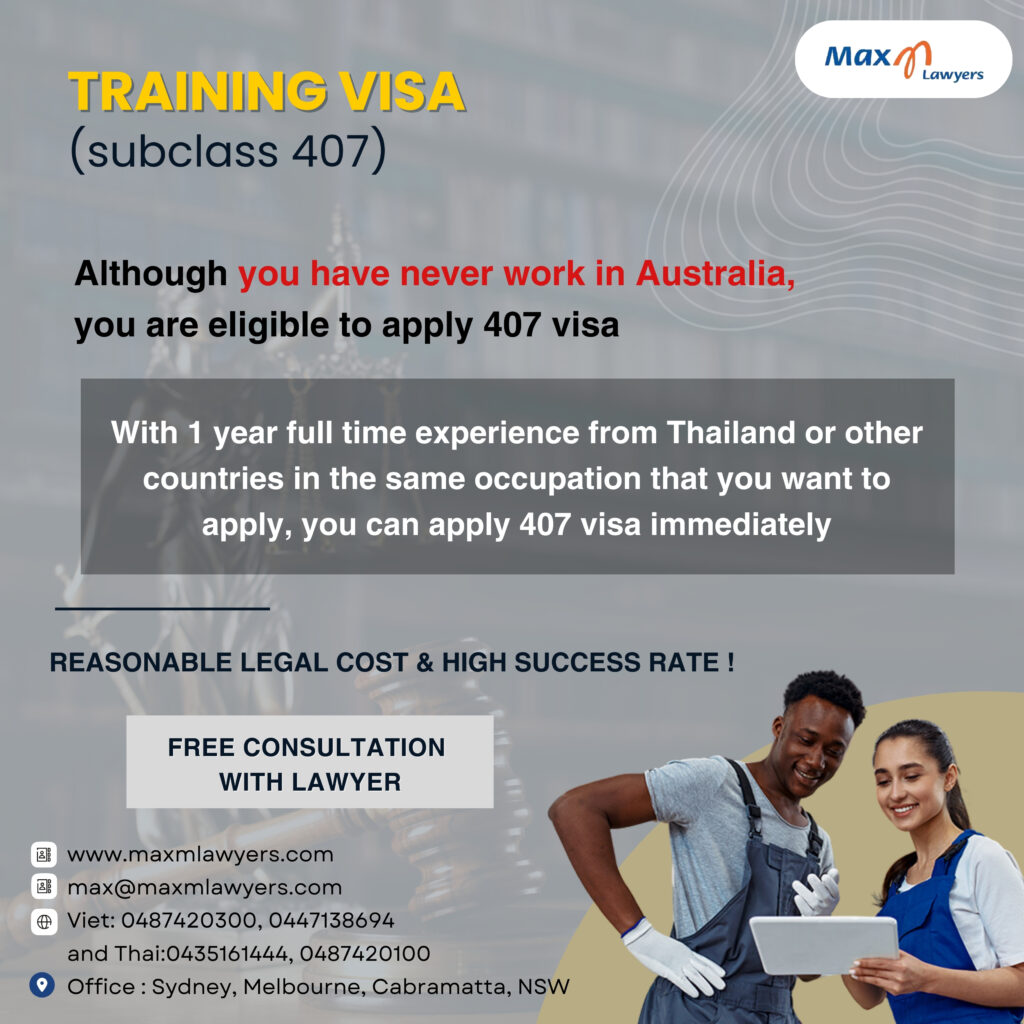
Temporary Skill Shortage visa (subclass 482)
Temporary Skill Shortage Visa (subclass 482) enables employers to address labor shortages by bringing in skilled workers where employers can’t source an appropriately skilled Australian worker.
With this visa, you can work in Australia for up to 2 years or up to 4 years if an
International Trade Obligation (ITO) applies. Hong Kong passport holders may stay up to 5 years. You can travel to and from Australia as many times as you want while the visa is valid and if eligible, apply for permanent residence
You should have at least 2 years relevant work experience in your nominated
occupation.
Sponsor can nominate and sponsor a skilled worker to travel to Australia to work in an occupation listed on the Short-term Skilled Occupation List (STSOL). You can also sponsor family members who apply for the visa with them.
If you don’t know how to do the skill assessment, contact us. We will help you to get the positive skill assessment.
In the first free consultation, after checking your visa status and conditions, we will recommend you whether you are eligible to apply for a visa. For your successful visa application, based on our knowledge and experience in applying for a visa, we will fill out your visa application and prepare additional documents. After your visa grant, we will let you know the decision from the department of immigration.
If your visa has been refused, contact us. We will help you to apply for ART.
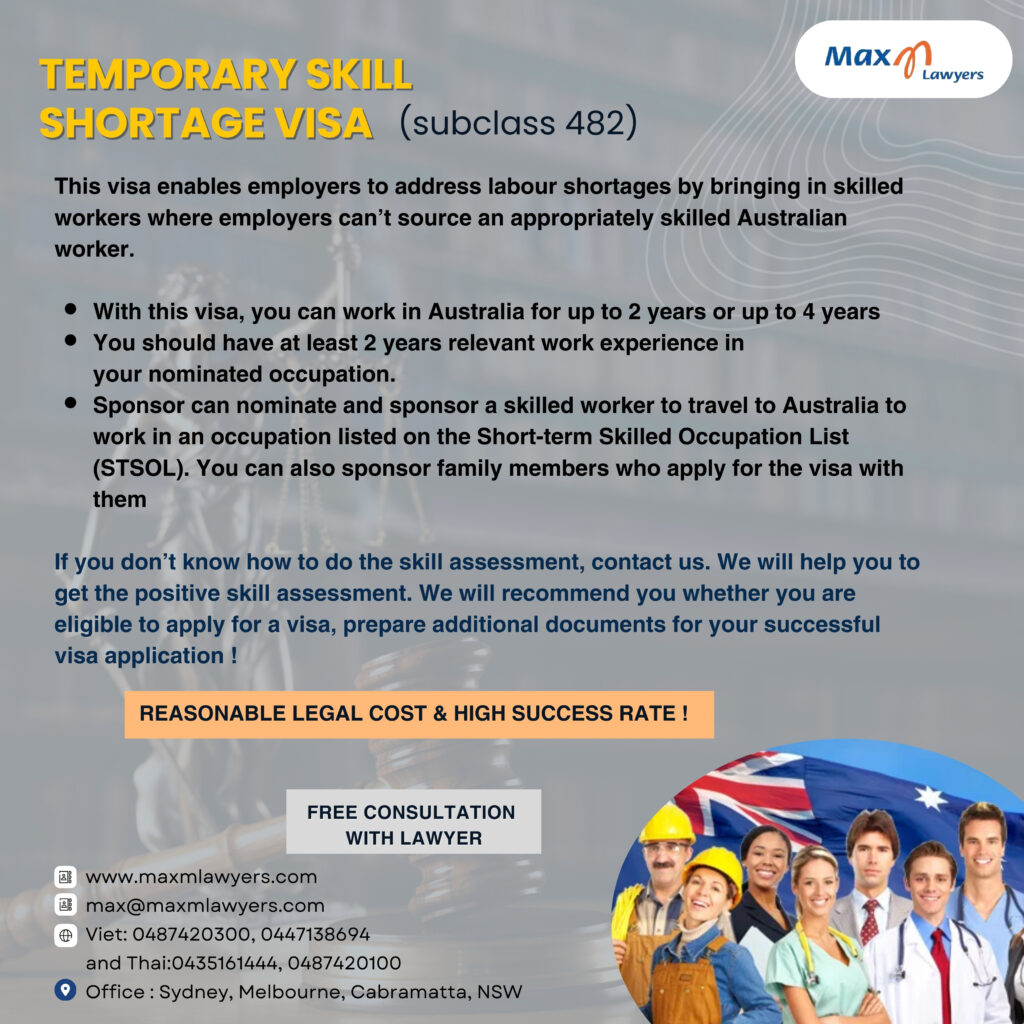
Skilled Work Regional Provisional (Subclass 491)
This visa will enable eligible skilled workers and their families to live, work and study in designated regional areas of Australia for 5 years. Visa holders will be eligible to apply for a Permanent Residence visa after 3 years.
Applicants for this visa must be:
● Be under the age of 45.
● Have Competent English or higher, and their dependent family members over 18 years of age have at least Functional English
● Obtain a positive skill assessment in an occupation on the relevant Skilled
occupation list
● Meet the pass mark in the skilled migration points test – currently 65.
● Lodge an Expression of Interest (EOI) through the SkillSelect system, and be invited to apply
● Be nominated by a State or Territory Government, or have sponsorship from an eligible family member
You can be either in or outside Australia when you apply for the visa, but you must not be in immigration clearance at the time of your application. If you apply from within Australia, you must hold a substantive visa or one eligible bridging visa.
You can include family members of the family unit in your application when you submit your visa application. You can also add a dependent child after you submit but before any decision is made on your visa application.
You can travel out of Australia and return as many times as you wish while the visa is valid. However, any time spent outside Australia does not extend the duration of the Visa.
In the first free consultation, after checking your visa status and conditions, we will recommend to you whether you are eligible to apply for a skilled employer sponsored regional visa application. For your successful visa application, based on our knowledge and experience in applying for a visa, we will fill out your visa application and prepare additional documents. After your skilled employer sponsored regional visa permit grant, we will let you know the decision from the department of immigration.
If your visa has been refused, contact us. We will help you to apply for ART.
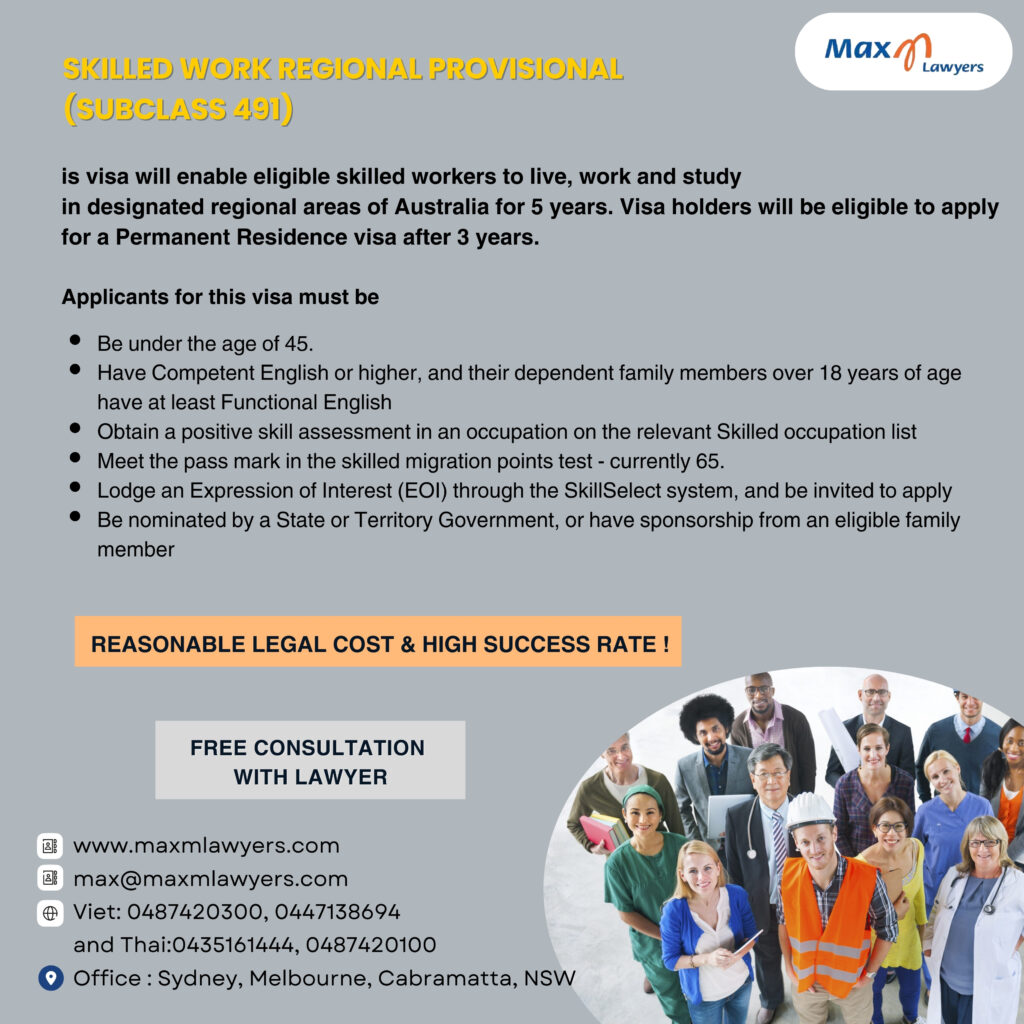
Skilled Employer Sponsored Regional (Provisional) visa (subclass 494) – Employer sponsored stream
This visa enables regional employers to address identified labor shortages within their region by sponsoring skilled workers where employers can’t source an appropriately skilled Australian worker.
With this visa, you can live, work and study only in designated regional
areas of Australia for 5 years. You can travel to and from Australia as many times as you want while the visa is valid. You can apply for permanent residence after 3 years from the time your visa is granted if eligible.
Applicants for this visa must be
● be nominated to work in an occupation on the relevant skilled occupation list
● have at least 3 years relevant work experience in your nominated occupation
● have a relevant skills assessment, unless an exemption applies
● work only for your sponsor or associated entity, unless an exemption applies
● be under 45 years of age, unless an exemption applies
● meet minimum standards of English language proficiency
Before you can apply for the visa, your employer will need to lodge a nomination application for you. They will only be able to do this if they are an approved work sponsor.
In the first free consultation, after checking your visa status and conditions, we will recommend to you whether you are eligible to apply for a skilled employer sponsored regional visa application. For your successful visa application, based on our knowledge and experience in applying for a visa, we will fill out your visa application and prepare additional documents. After your skilled employer sponsored regional visa permit grant, we will let you
know the decision from the department of immigration.
If your visa has been refused, contact us. We will help you to apply for ART.
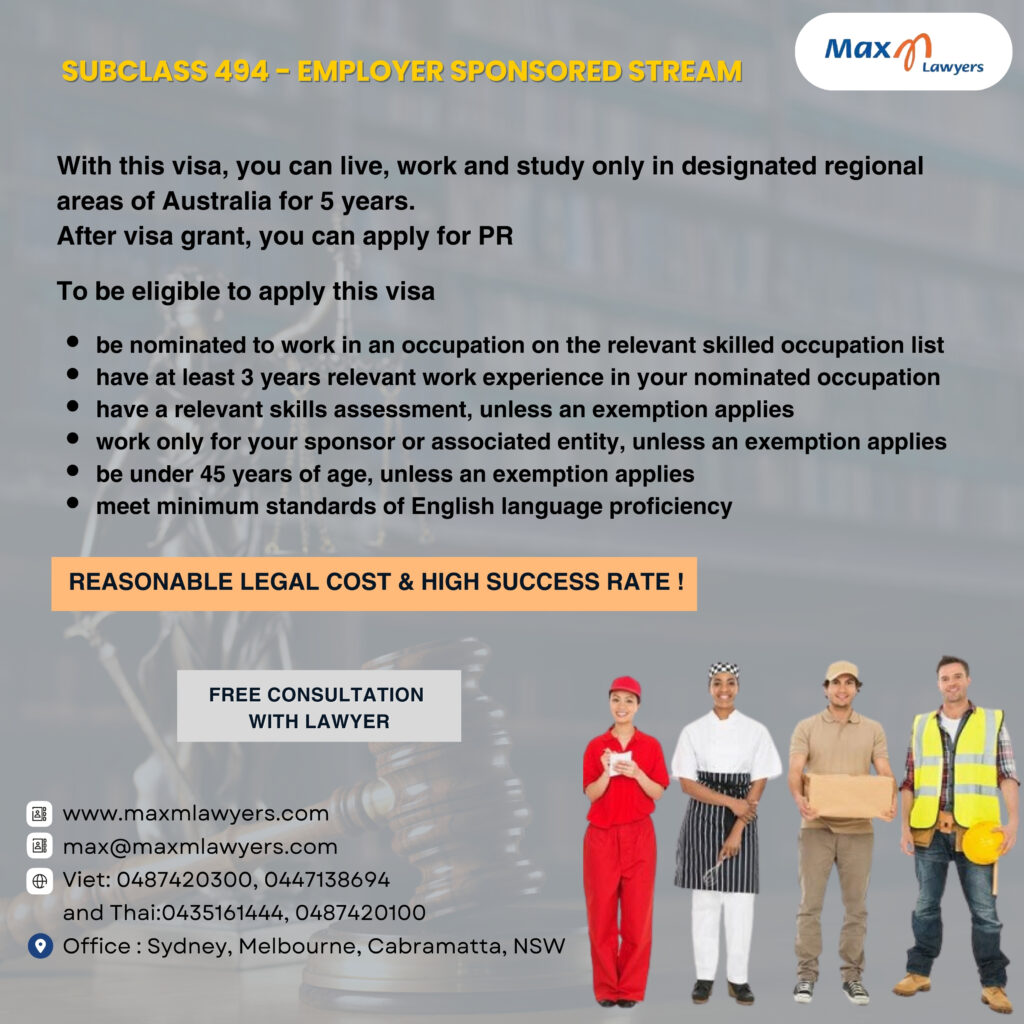
Employer Nomination Scheme visa (Subclass 186)
Employer Nomination Scheme visa lets skilled workers, who are nominated by an employer, live and work in Australia permanently.
With this visa, you can live, work ad study in Australia indefinitely. You can sponsor eligible family members to come to Australia. You can also apply for Australian citizenship.
To be eligible to apply for a 186 visa, the organisation must offer the worker
a full time eligible employment position that is available for at least 2 years from date of visa grant.
This visa is only available to workers employed or being considered for employment in an occupation listed on the Medium and Long‐term Strategic Skills List (MLTSSL).
The worker will need to be under 45 years of age, have a positive skills assessment (Direct Entry Stream) in their nominated occupation, at least 3 years of relevant full time work experience and at least competent English. In addition, the applicant and family members must satisfy health and character requirements.
We provide professional end to end assistance with 186 visas, managing all aspects related to the nomination and visa criteria. Our professional services include: Assessing circumstances and advising on criteria and eligibility; Advising on essential documentation and information required by the organisation and worker; Preparing and lodging the nomination and visa applications; Communicating with the Department on behalf of the
organisation and the visa applicant until a decision is received .
MAX M LAWYERS is your trusted partner for navigating the Employer Nomination Scheme (ENS) visa application process. With over 20 years of experience in immigration law, our team has a record of high success rate with affordable prices and a deep understanding of the complexities involved. We are committed to providing personalised support at every step, ensuring you meet all eligibility requirements.
Let us help you secure your future in Australia with confidence!
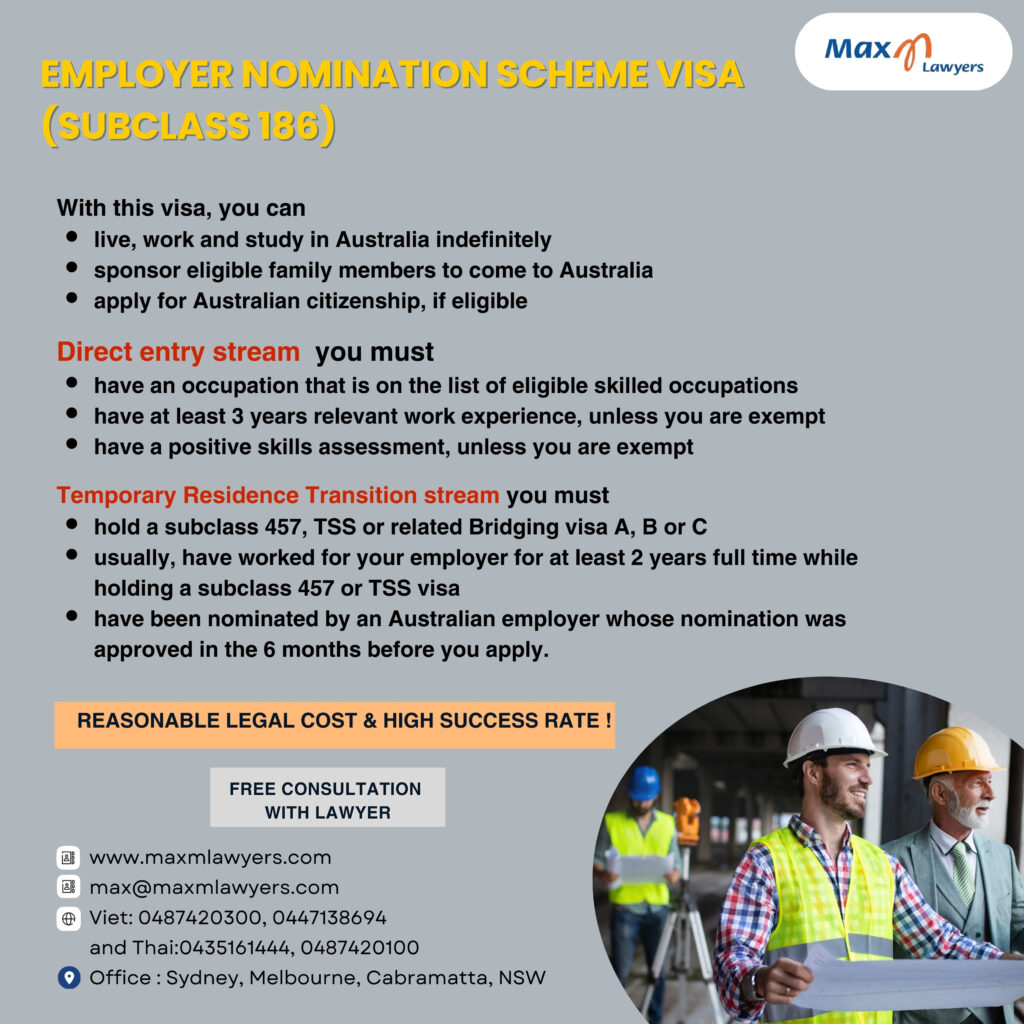
Work Permit
If your Bridging visas have the Condition 8101 (‘no work’) which means you are not allowed to work, you can apply permission to work to remove this condition.
You can apply for a new bridging visa with different conditions to the one currently held.
You need to provide evidence of a ‘compelling need to work’, that is, show that you are in financial hardship. If you hold a Bridging visa A, B or C and are seeking judicial review of a refusal decision on your Protection visa application, you will only be permitted to work if you had permission to work on the last bridging visa.
We can help with seeking permission to work applications. For your successful work permit application.
In the first free consultation, after checking your visa status and conditions, we will recommend you whether you are eligible to apply for a work permit application. For your successful visa application, based on our knowledge and experience in applying for a visa, we will fill out your visa application and prepare additional documents. After your work permit grant, we will let you know the decision from the department of immigration.
From now on, you can work lawfully in Australia.
If your visa has been refused, contact us. We will help you to apply for ART.
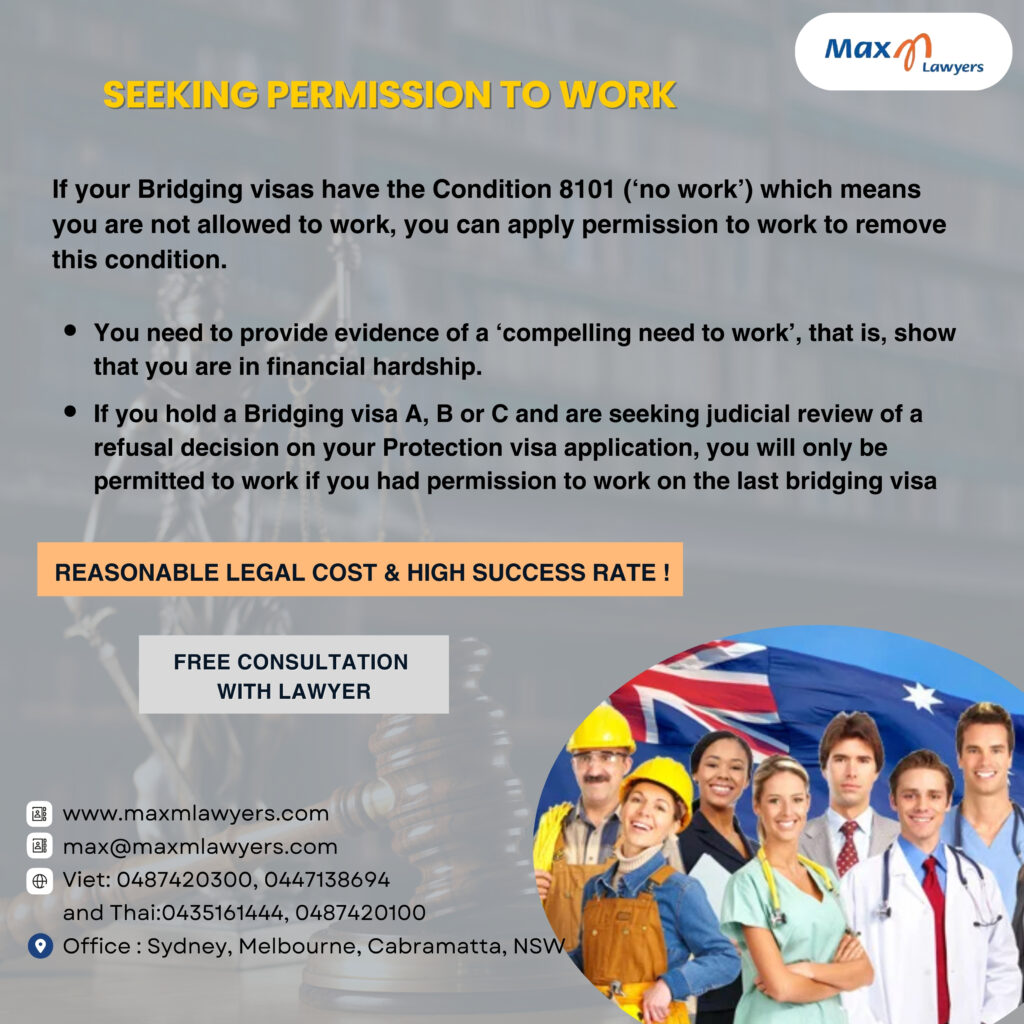
Temporary Graduate visa (subclass 485) – Post-Higher Education Work stream
This visa is for international students who have recently graduated with a degree from an Australian institution. It lets you live, work and study in Australia temporarily. With this visa, you can stay in Australia for between 2 to 3 years after you have finished your studies and travel, work or study in Australia during your stay. You must be aged 35 years or under when
you apply. Be in Australia when you apply for this visa. You should have held a student visa in the last 6 months and have a recent degree in a CRICOS-registered course. You should also provide evidence of adequate health insurance and an Australian Federal Police check for all applicants when you apply. Furthermore, you should provide evidence of the required
level of English with your application.
This is a temporary visa. The length of your stay in Australia will depend on the level of your Australian study qualification. For the Bachelor (including honors), and Masters (coursework and extended) degree you can stay for 2 years. For the Masters (research) and Doctoral degree, you can stay for 3 years.
You can include members of the family unit in your application when you apply, if they are in Australia, family members who apply for this visa
must meet the health and character requirements. You can add your children to the application until the department of immigration decides on your application. You can’t add any other member of the family unit to your application during that period. If a family member wants to be added to your visa after we have granted it, they can apply as a subsequent entrant from inside or outside Australia. You can be in Australia (but not in immigration
clearance) when you apply for this visa. Subsequent entrants can be in or outside Australia when they apply. All applicants can be in or outside Australia at the time of decision.
We can help with your visa applications. For your successful visa application, we use knowledge of, or experience in, migration procedure to assist with visa applications or other visa matters by preparing, or helping to prepare a visa application or other document.
advising about a visa application or visa matter. representing in, or preparing for, proceedings before a court or review authority in relation to a visa matter.
In the first free consultation, after checking your visa status and conditions, we will recommend you whether you are eligible to apply for a visa. For your successful visa application, based on our knowledge and experience in applying for a visa, we will fill out your visa application and prepare additional documents. After your visa grant, we will let you know the decision from the department of immigration.
If your visa has been refused, contact us. We will help you to apply for ART.
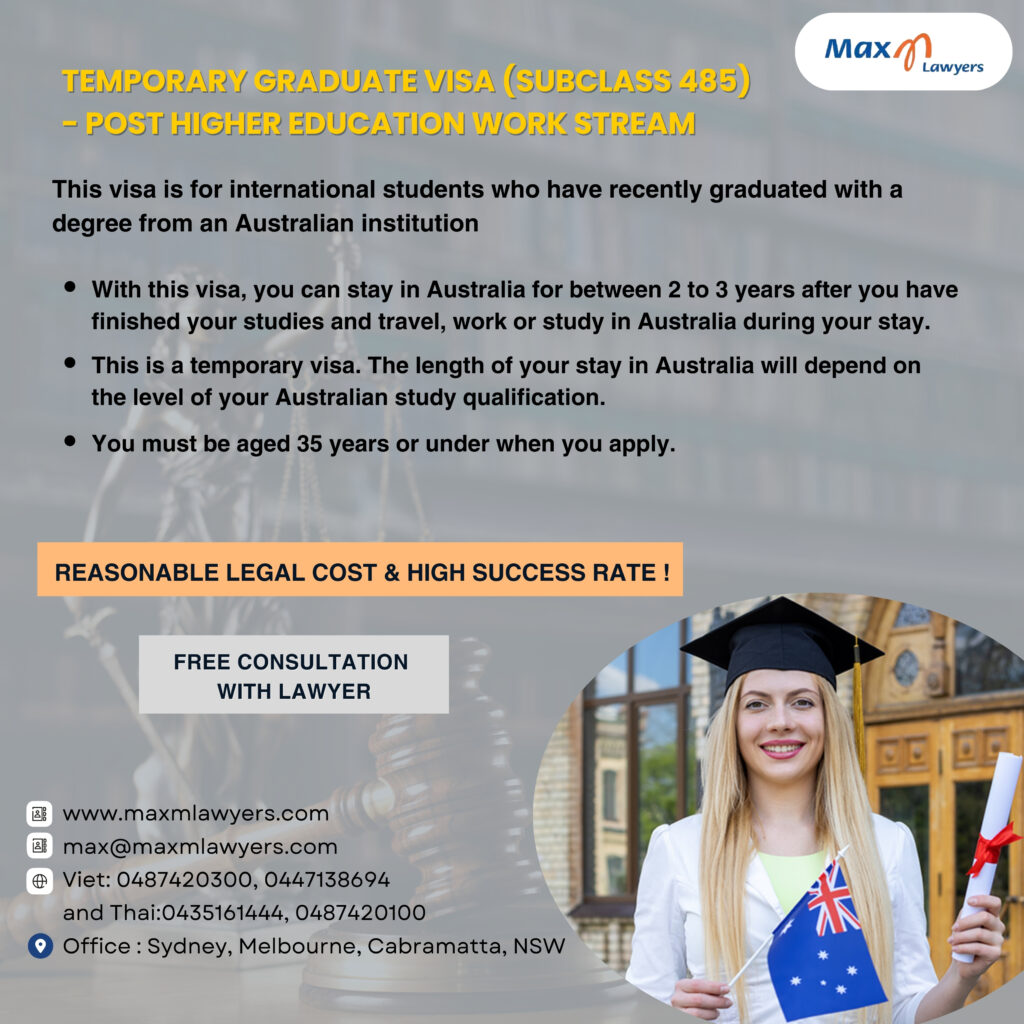
Skilled Independent visa (subclass 189)
This visa lets invited workers with skills to live and work permanently anywhere in Australia.
With this visa, you can stay in Australia permanently, work and study in Australia, enroll in Australia’s public health care scheme, Medicare.
We can sponsor your relatives to come to Australia, travel to and from Australia for 5 years, if eligible, become an Australian citizen.
You must have an occupation on the relevant skilled occupation list, have a suitable skills assessment for the occupation, be invited to apply for this visa and satisfy the points test.
You must be aged under 45 when we invite you to apply for the visa. You can still apply for the visa if you turn 45 after the department of immigration invites you to apply. If you turn 45 after you submit your EOI but before they invite you to apply, you will not be invited to apply.
This is a points-tested visa. When you submit your EOI in SkillSelect you will be given an indicative points score based on the claims you have made. If you do not obtain a score of 65 points you will not be invited to apply for this visa.
If you are invited to apply for the visa, your invitation will state the number of points that you must score when they assess your application for grant of the visa.
If you don’t know how many points, we can help you calculate your points score for your EOI and help you submit EOI.
If you are invited, you should apply for a visa within 60 days.
In the first free consultation, after checking your points, we will recommend you whether you are eligible to apply for an EOI and visa application. For your successful visa application, based on our knowledge and experience in applying for a visa, we will fill out your visa application and prepare additional documents. After your visa grant, we will let you know the decision from the department of immigration.
If your visa has been refused, contact us. We will help you to apply for ART.
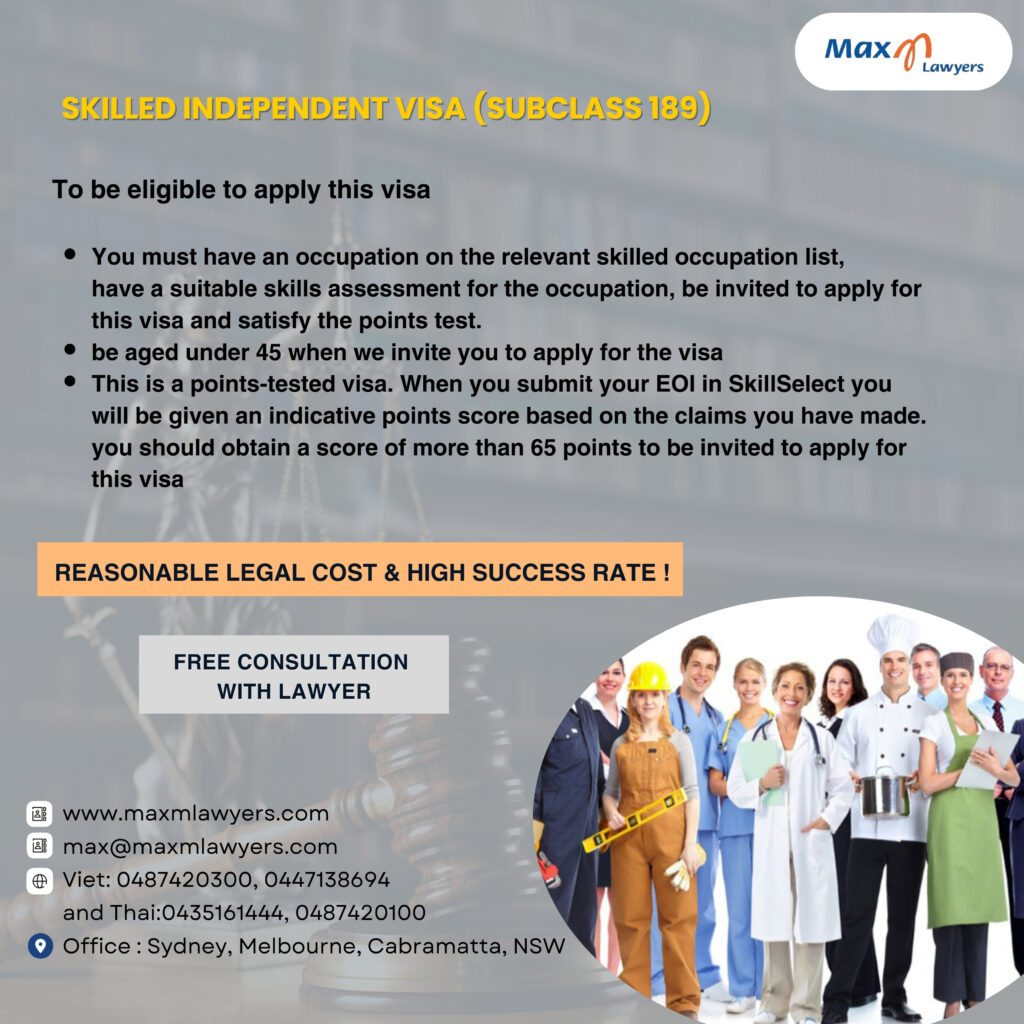
The Administrative Review Tribunal (ART)
From 13 October 2024, ART replaced the Administrative Appeals Tribunal (AAT).
The ART reviews decisions made by Australian Government agencies, departments and ministers. If you have received a decision of visa refusal from the department of the immigration which you don’t agree with, you can apply to the ART to review your case. The time limits for applying for a review are very strict. So, you have to apply for a review within the date which was specified in the refusal letter.
We can help with your applications for the ART. Firstly, our lawyers will give the consultation by reviewing your refusal letter and decision record. After that they will submit the applications for you. They also will give the advice for which supporting documents you should provide to the ART and advise you on how to answer in the hearing in order to succeed in your case. Moreover, they will attend the hearing with you.
If your case from the ART is not successful, contact us. Our experience lawyers will help you to apply for the Family Circuit and Family Court of Australia (FCC) of immigration.
If your visa has been refused, contact us. We will help you to apply for ART.
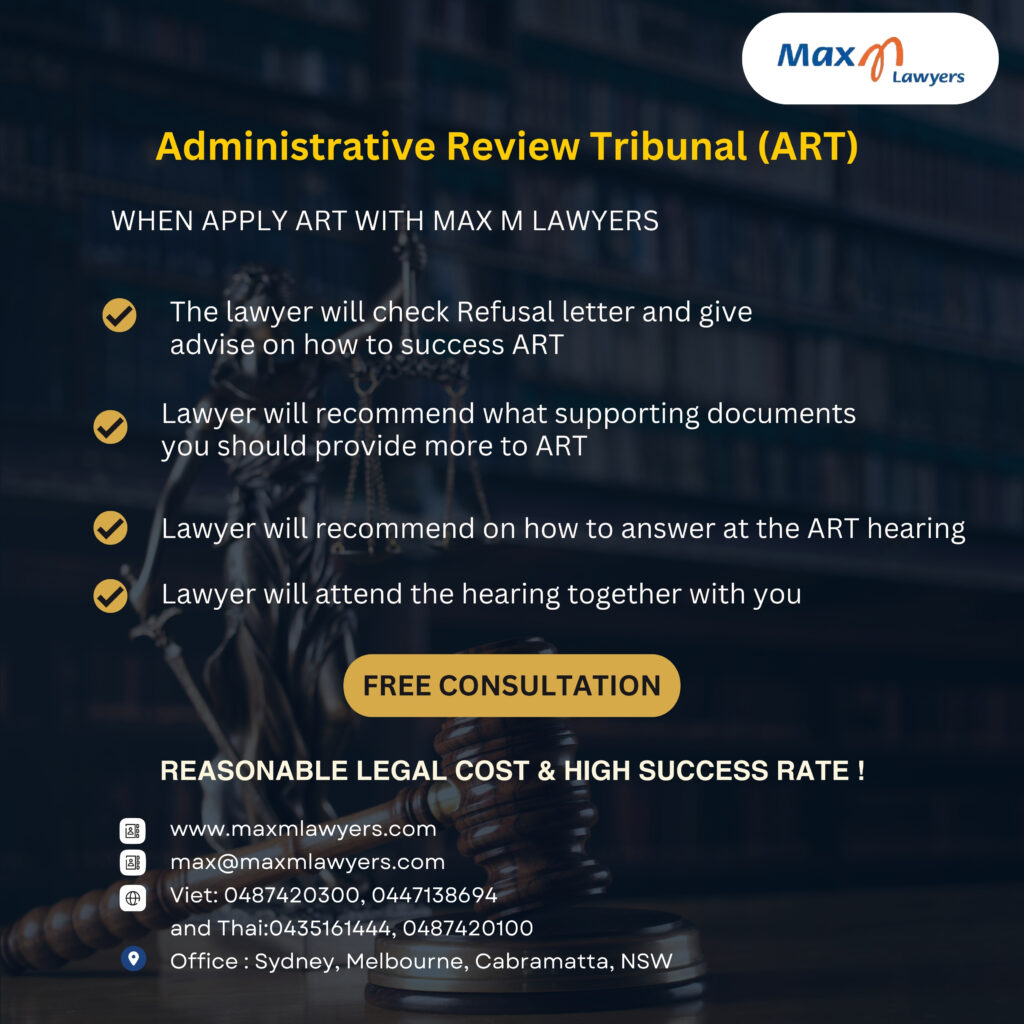
Federal Circuit and Family Court of Australia (FCC)
After the Administrative Review Tribunal (ART) made a decision, they will provide a final independent merits review of visa made by officers of the Department of Home Affairs (the department). If ART affirmed, the decision, the delegate’s decision should not be changed.
If you decide to seek judicial review, you can apply to the FCC of the decisions within 35 days of the date of the decision. The FCC will consider whether ART made a jurisdictional error. If you require an extension of time, you must ask for it in the application and explain why. The Court will decide whether or not to grant an extension of time. You should apply for another bridging visa before your current bridging visa ceases.
To apply for a FCC, you will need to complete an Application – Migration Act form and prepare an Affidavit to support your application. An affidavit is a written statement prepared by a party or a witness in a court case. It is the main way your present evidence (facts of the case) to a court.
You must complete all parts of the application form. If you don’t, the form might be returned to you, causing a delay. You can prepare your own affidavit, but it is usually hard to do so. If you want help preparing your affidavit, please contact our specialised lawyers.
Your application must identify what jurisdictional error you believe the decision maker has made. In your affidavit, you must explain all the relevant facts and circumstances relating to the alleged error.
If you believe your application is urgent, you should indicate this on your application form and explain why the application should be heard on an ‘expedited basis’. If your case becomes urgent while you are waiting for your final hearing, you can apply for an expedited hearing.
To apply for a reduced fee, or an exemption from paying court fees because you cannot afford either the full or reduced fee, you need to file an Application for Exemption from Paying Court Fees or Reduction – Financial Hardship form.
Court staff will check that the application is complete and that you have done
everything that is formally required, including paying the filing fee. The Court will then stamp the application. Stamping shows that your application has been accepted by the Court.
You must then notify the Minister by serving the application.
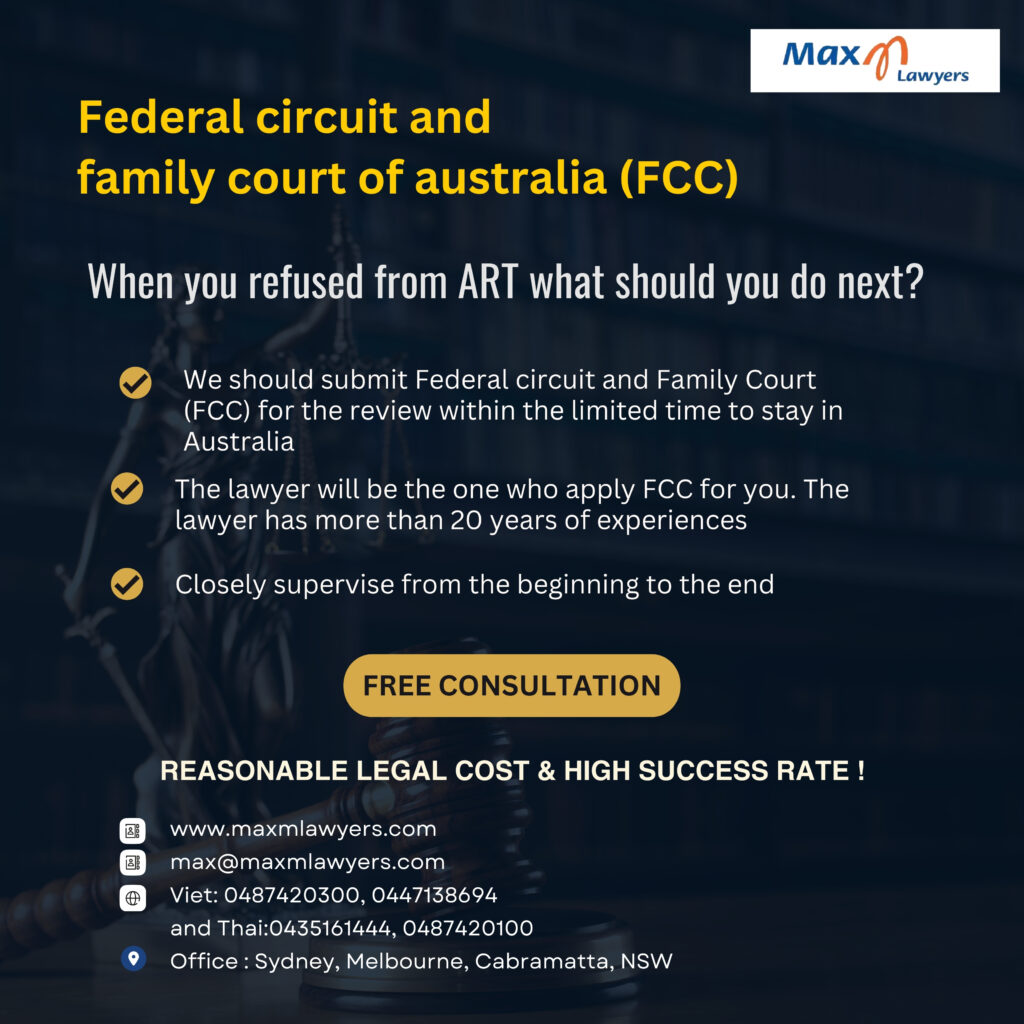
Minister Intervention
We can make a request for ministerial intervention if you have
had a merits review tribunal decision.
The Minister has powers under the Migration Act 1958 to
replace a decision of a merits review tribunal on a person’s case with a decision that is more favourable to that person if the Minister thinks it is in the public interest to do so.
The Minister’s guidelines describe the types of cases that
might be referred for the Minister’s consideration.
The Minister has described the types of unique or exceptional
circumstances in which a case might be referred for the Minister’s
consideration.
Types of unique or exceptional circumstances
● Strong compassionate circumstances that if not recognised
would result in serious, ongoing and irreversible harm and continuing hardship to an Australian citizen or an Australian family unit, where at least one member of the family is an Australian citizen or Australian permanent resident.
● Compassionate circumstances regarding your age and/or health and/or psychological state, that if not recognised would result in serious, ongoing and irreversible harm and continuing hardship.
● Exceptional economic, scientific, cultural or other benefit
that would result from you being permitted to remain in Australia.
● Circumstances not anticipated by relevant legislation leads
to unfair or unreasonable results.
They will inform you in writing of the outcome of your request.
If you are in the community and are an unlawful non-citizen, the minister will
finalise your request without further processing.
This means that you must hold a bridging or other visa, or have applied for
a Bridging visa C, Bridging visa D or Bridging visa E.
If you have any questions about your immigration status while your request is in processing, please contact our specialised lawyers.
If you are the partner of an Australian citizen, permanent
resident or eligible New Zealand citizen you could be eligible to make an application for a Partner visa even if you have been refused another type of visa while in Australia.
The Minister’s powers are not available in the following circumstances:
● there is no review decision by a merits review tribunal
● a Minister has already intervened to grant a visa
● a tribunal has found that it does not have jurisdiction to
review a decision
● a tribunal has found that the review application was made
outside the time limits
You should not discontinue any application for judicial
review.
You can only include family members in your request if they have also had a
merits review tribunal decision in their case.
The minister might also ask you to provide additional information after you have provided supporting documents.
The Minister has provided guidance on the types of unique and exceptional
circumstances that could be brought to the Minister’s attention.
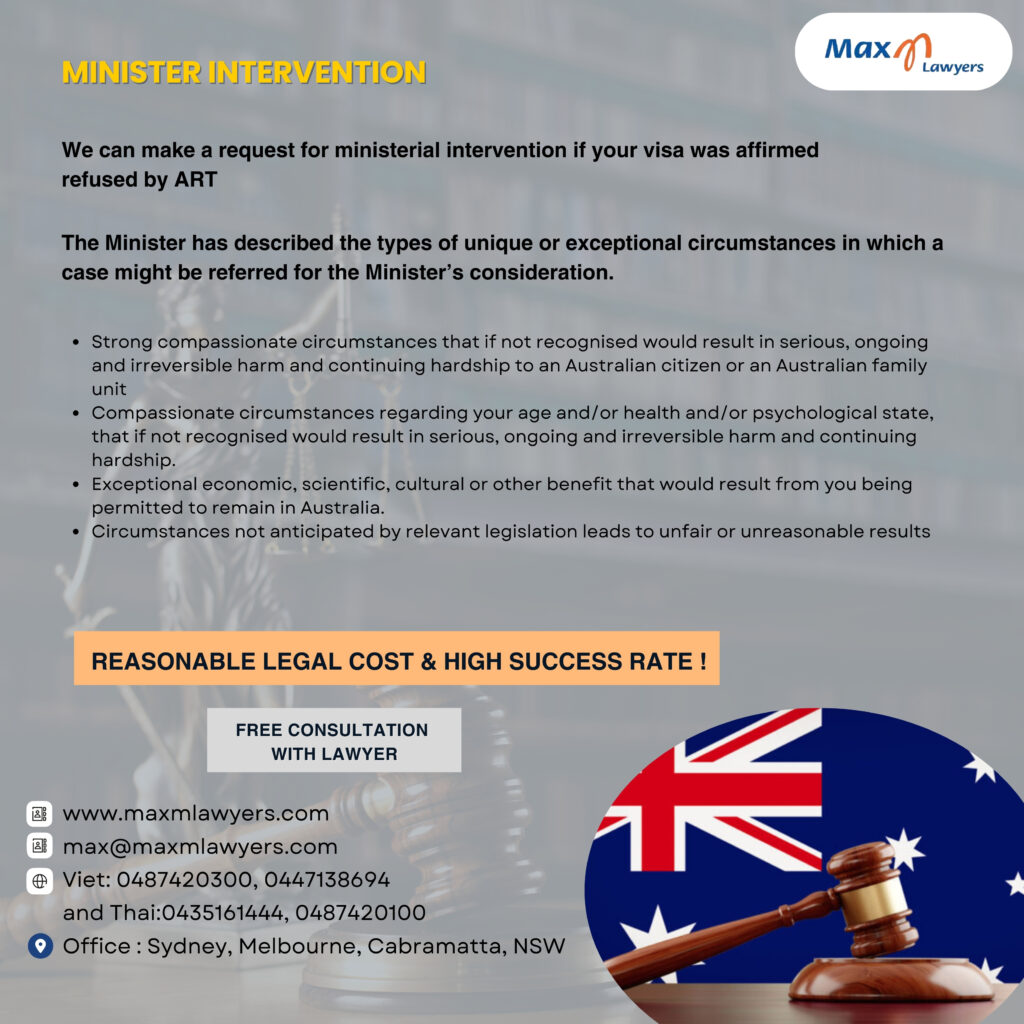
Bridging Visas
Bridging visa allows you to stay in Australia after your current substantive visa ceases and while your new substantive visa application is being processed. The bridging visa will come into effect when your current substantive visa ceases. However, a separate application for a Bridging Visa is necessary when you have applied for juridical review.
You might be allowed to work in Australia depending on the visa conditions. Your grant letter will tell you about these conditions. If your Bridging Visa does not let you work, or has restrictions on working, you can apply for another Bridging Visa that lets you work. To be considered for a Bridging Visa that lets you work, you will usually have to demonstrate that you are in financial hardship.
A Bridging Visa will end immediately if you leave Australia while your Bridging Visa is in effect. The Bridging Visa will also end if you are granted the substantive visa you applied for as well as you are granted another Bridging visa.
Bridging visa B (BVB) allows you to leave and return to Australia within the defined travel period while your application for a substantive visa is being processed. The BVB travel facility may be granted with single or multiple travel. If the travel facility has ended or does not have sufficient validity remaining to cover your proposed journey, then you will need to apply for and be granted a new BVB prior to leaving Australia.
To be eligible to apply for BVB, you must be in Australia when you apply for this visa. You must have held a substantive visa and be the holder of a BVA or a BVB. A BVB comes into effect when your current substantive visa ceases.
In the first free consultation, after checking your visa status and conditions, we will recommend you whether you are eligible to apply for a visa. For your successful visa application, based on our knowledge and experience in applying for a visa, we will fill out your visa application and prepare additional documents. After your visa grant, we will let you know the decision from the department of immigration.
If your visa has been refused, contact us. We will help you to apply for ART.
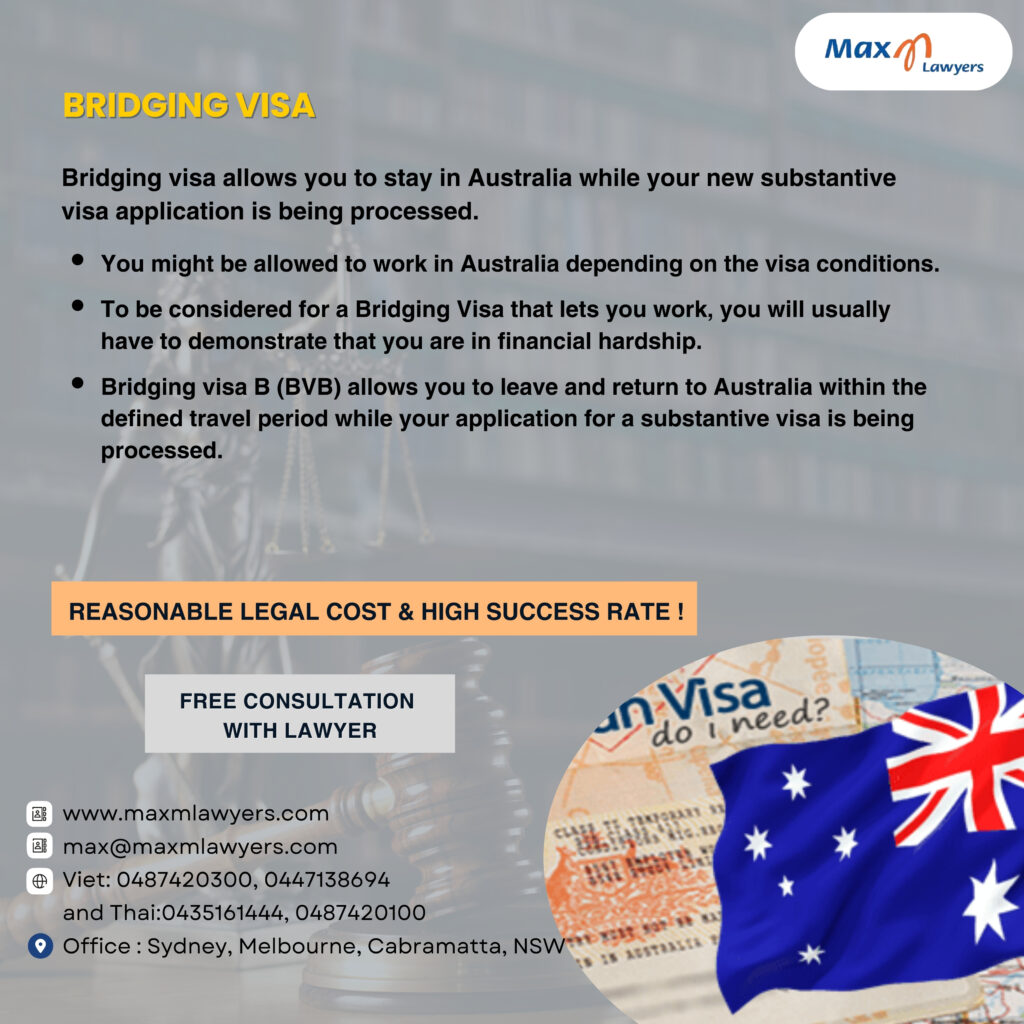
Resident Return Visa (Subclass 155 and 157)
If you leave Australia after your travel validity expires, or it expires when you are outside Australia, you will not be able to return to Australia as a permanent resident. This visa allows you to return as a permanent reside
You must be either
● an Australian permanent resident
● a former Australian permanent resident whose last permanent visa was not cancelled
● a former Australian citizen who lost or renounced Australian citizenship. Australian citizens are not eligible to apply for an RRV.
If you are already in Australia as a permanent visa holder, you do not need to apply for this visa unless you wish to leave and re-enter Australia as a permanent resident.
There are no limits on the number of Resident Return visas (RRV) you can apply for.
We will check the travel facility expiry date of your permanent visa before you apply for an RRV to see if it covers your intended travel period. You can check this on VEVO.
If you :
● were present in Australia for a total of at least 2 years in the last 5 years as a permanent visa holder or Australian citizen, then you meet what is known as the ‘residence requirement’ and will be given a 5-year travel facility on your RRV.
● have not met the ‘residence requirement’ but have demonstrated you have
substantial ties with Australia that benefit Australia, then you can only be given a maximum of 12 months travel facility on your RRV. See ‘eligibility’ for the requirements.
● have applied as a member of the family unit of a person who already holds an RRV, or who has lodged a separate application for an RRV and meets the time of application criteria for grant, then you can only be given a maximum of 12 months travel facility on your RRV.
● have not met any of the above requirements, but have compelling and
compassionate reasons for departure, then you can only be given 3 months travel facility on your RRV (subclass 157) if you have not been absent from Australia in the 5 years prior to making an application.
It is not possible to carry over the remaining travel facility from any previous visa to the subsequently granted RRV.
If you return to Australia without a permanent visa and a valid travel facility (for example, when holding a visitor visa), this might impact your:
● entitlements as a permanent resident
● ability to satisfy the permanent residence requirements when applying for Australian citizenship or another RRV.
You can be in or outside Australia when you apply for the visa but not in immigration clearance.
When an RRV application is lodged, applicants are assessed against the criteria for both subclass 155 and 157 visas.
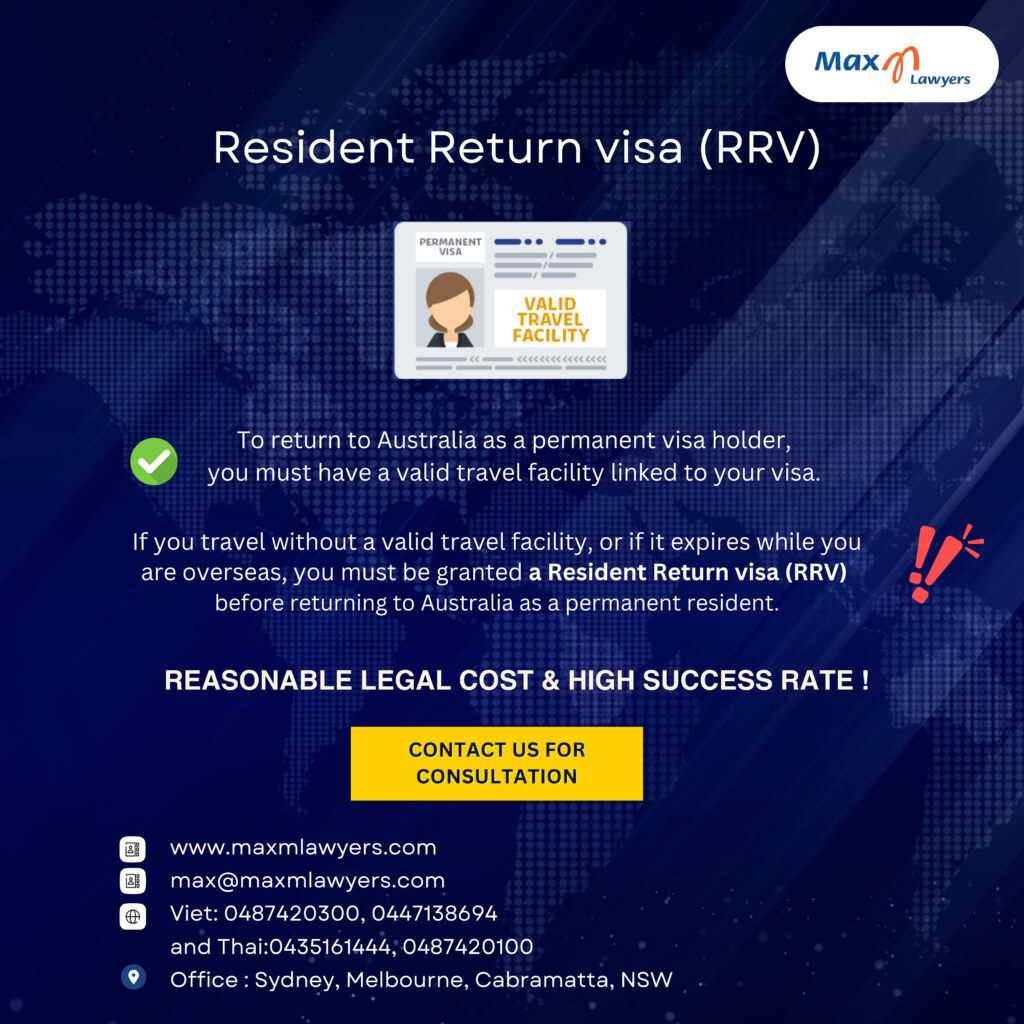
Freedom of Information (FOI)
The Freedom of Information Act 1982 (FOI Act) gives you a right request documents held by the Department of Home Affairs and Administrative Review Tribunal (ART).
They will give you the documents by FOI Act.
You can ask for information about your own visa or citizenship applications or decisions. You can also amend (change) or annotate (add a comment to) incorrect personal information.
If you are seeking access to documents, they will require proof of your identity before the release of any personal information.
If you need to submit a FOI Request to them, we can help to submit your request by completing the FOI Application Form. At Max M LAWYERS, we specialise in providing expert legal assistance seeking access to information. We work closely with you to prepare comprehensive applications, respond to rejections or delays, and advocate for your right to information.
After submitting your request, we will send you an acknowledgement letter.
When a decision is made on your access request, we let you know about the decision from them.

